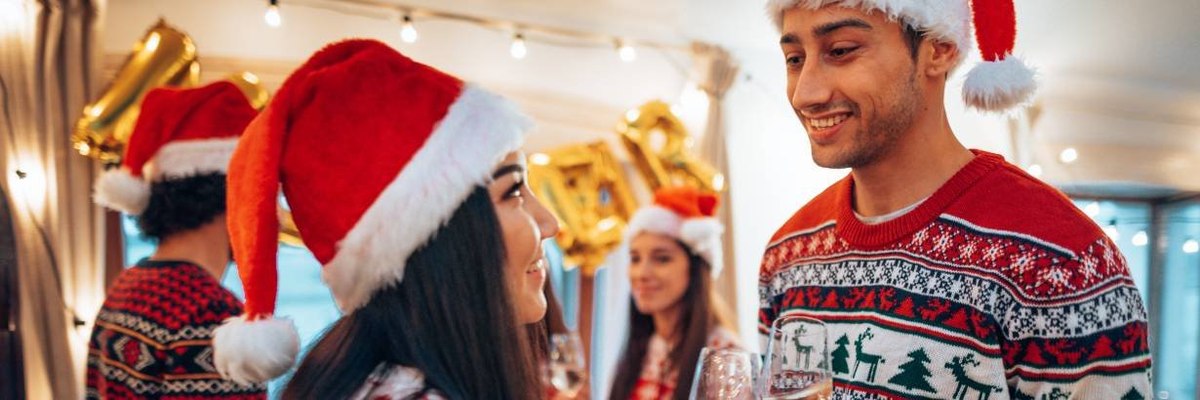Advent calendars, Christmas jumpers and staying with parents on Christmas Eve are some of the childhood festive traditions many Britons uphold in adulthood
Christmas can be a time to indulge in tradition and nostalgia, with warm childhood moments looming large in the memory for many Britons.
But how many manage to hold onto the festive magic into adulthood?
YouGov asked those who celebrate Christmas what kind of typical childhood traditions they are upholding as grown-ups.
Topping the list was opening an advent calendar, with nearly two-thirds of people who celebrate Christmas (65%) admitting they open their own, including 35% who didn’t open one as a child but make sure they do now.
Wearing a Christmas jumper came next – half of those who celebrate the occasion (51%) like to wear one, and like with opening advent calendars, more picked up the tradition as an adult than as a child (27%-24%).
Nearly half (45%) of Christmas fans are happy to build a snowman where the weather allows and more than one in three (36%) dress in their smartest clothes on Christmas Day, including 31% who started that tradition in childhood.
A quarter have opening Christmas stockings as part of their festive celebrations (25%), while 24% attend carol services, including 20% of all Christmas celebrators who are carrying on the tradition from childhood.
Christmas Eve at the childhood home is the tradition most likely to be dropped in adulthood
About one in five adults who celebrate the occasion (22%) say they typically stay at their parents’ house or their childhood home on Christmas Eve.
But for most, this is a tradition that has been left in the past, with 64% saying they did this as a child but no longer do.
And nearly three-quarters of Britons who celebrate (73%) say they will not be opening a stocking someone else has filled with gifts for them, including 56% who did so as a child.
Writing to Santa Claus is a tradition for children rather than adults, YouGov’s poll suggests – 18% still write a list of gifts they hope to receive but they are outweighed by the 80% who don’t, including 53% who used to pen such lists in childhood.
Some Britons are making up for lost time by adopting festive traditions they never had as children
One in three Britons who celebrate Christmas (35%) say they never opened an advent calendar of their own as a child, but like to do so now.
That makes it the common festive tradition most likely to be adopted in adulthood, followed by the donning of a Christmas jumper – about one in four (27%) say they wear one as an adult, but never did in childhood.
Singing carols door to door is the least likely Christmas tradition to be adopted by adults, with just 2% of those who celebrate saying they like to take merry tunes around the neighbourhood despite not having done so in their youth.
Younger people are generally more likely to still uphold festive traditions
The traditional enjoyment of many of YouGov’s common Christmas activities declines with age – 50-and-overs say they are far less likely to uphold most of the traditions than younger people.
But they’re more likely to be well turned out on Christmas Day, with 42% of 50 to 64-year-olds who celebrate and 40% of the over-65s saying they still like to wear their smartest clothes for the occasion (compared to 31% of 18 to 24-year-olds and a third (33%) of 25 to 49-year-olds).
And those aged 50 and over are also more likely to sing carols at a service – three in ten over-65s (30%) and 28% of 50 to 64-year-olds say they do, compared to between 18% and 19% of the under-50s who celebrate Christmas.
Younger people are much more likely to unwrap gifts from a Christmas stocking than older generations are – around half of 18 to 24-year-olds (49%) say they uphold the tradition, compared to 16% of the 65-and-overs.
Women are more likely than men to uphold festive childhood traditions
Women are more likely than men to uphold most of the traditions on YouGov’s list, with the biggest gender gap seen in the decision to wear smart clothes on Christmas Day.
Nearly half of women (46%) say they make the effort to wear their smartest clothes for Christmas, compared to around a quarter of men (26%).
And women are far more likely to wear Christmas jumpers (58% of women, to 42% of men) and open advent calendars (40% to 29%).
However, the gender gap is almost non-existent around some traditions, including opening Christmas stockings (26% of women do this compared to 25% of men) and staying over at the parental or childhood home on Christmas Eve (22% to 21%).
Picture: Getty









